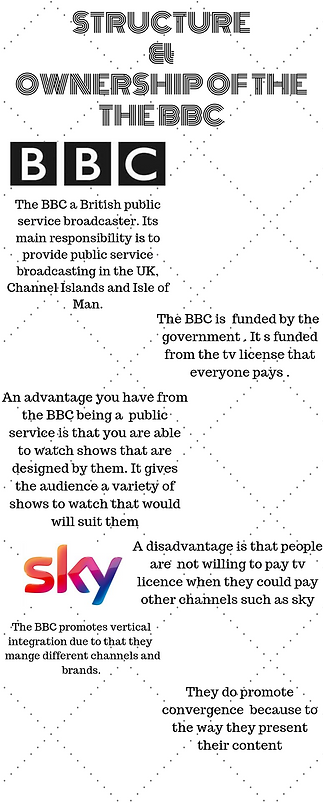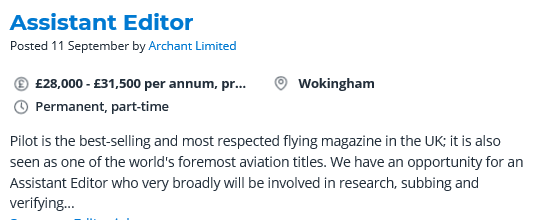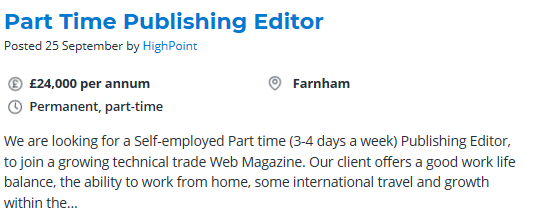top of page

Professional Practice
Task 1:
What is horizontal integration?
Is when a business that is working at the same level of value in a similar or different industry. It is a competitive strategy that companies use. some people join together so that it cuts down on competition it will reduce what is available to the customers. They join to increase their market.
What is Vertical integration?
Is when a company owns different businesses that are in the same area of production and distribution. The company expands its business into different areas that are at contrasting points that are on the same production area. It will own the manufacture and controls the distribution, and is the retailer.
What is the difference between private ownership and public service media?
The main difference between a private vs public company is the shares of a public company are alternated in a stock change. A private company don't shares its stock. Private company is independent from the government and able to publish the truth for free. They depend on the clients to promote them. The public services is well financed.They are able to let the audience interact for free.
What is a multinational, independent and voluntary company?
A multinational company is a business that operates in many different countries at the same time. Today’s international markets are almost unavoidable even for smaller companies. The Chinese manufacturing and less expensive Asian labour has pushed large and small companies to invest in operations and expansions overseas. In another country they could have a supply chain. An independent company is when the company is not owned by another company.
Voluntary company refers to people spending their time helping others.There are several types of groups that use volunteers to help aid in the cities, counties and countries that have experienced a disaster. Many of these groups offer food, water and assistance with rebuilding the local structures. These groups help out during a large disaster, such as a tornado, hurricane or large snowstorm. Other types of voluntary organizations help out their local communities with basic services.
What is a conglomerate?
A media conglomerate is a company that owns large numbers of companies in various mass media such as television, radio, publishing, movies, and the Internet. Media conglomerates strive for policies that facilitate their control of the markets across the globe.
What is diversification in media?
Diversification is the approach of media companies expanding and branching out in to different areas of the media industry. For example a company does television broadcasting branching out in to radio broadcasting or internet streaming, this is diversification as the company is diversifying what they do, creating a more diverse company.
What is media convergence?
Convergence is where several media channels come together to exist and operate in synergy. Some may define it by it stating it to be a merger of mass media and communication outlets. In some cases, multi-utility of the same gadget or media is also applyed to be a convergence. With the advancement of time and technology, manufacturers of technology are engaged in a race to manufacture devices that have maximum number of media converged within them.
Task 2
Television
Structure & ownership
Television is the largest sector that is within the media industry that has a lot of competion. In TV broadcasts different types of programmes and films.
The BBC is the largest company. It was founded and first organized in 1922 by a group of radio executives and John Reith became the general manager of an organization . Then in 1936 the BBC’s broadcasting system was started as an experimental service in the London area and by 1938 there were over 11,000 receivers in use. Today the BBC has grown and become an larger organisation. The company now has 9 television channels; BBC one, two, three, four. The cbbc and cbeebies channels for kids and a BBC HD channel plus BBC news and BBC parliament. There is the BBC online website for users and they have recently developed and released iplayer, a piece of software which lets users view programmes that have aired or that are currently airing live on the BBC website. All of these channels and services are all paid through the money that the tax payer pays. Through your tv licence you pay your contribution to the BBC. Mark Thompson the general director of the BBC has the overall decision on what gets commissioned and what gets decommissioned. ITV is a private company that is 60% owned by ITV PLC, also owned by STV group PLC. Channel 4 is a private company that is funded by advertising. Channel 5 is also a private company that is owned by the Northern Shell which is owned by Richard Desmond.
BBC
The BBC promotes Vertical integration because the brand and manages other channels. They are a public service due to that they funded from the public. Is an independent, publicly-funded television and radio broadcasting organisation, with extensive interests in programme production, news gathering and commercial publishing. The BBC is not an example of conglomerate but they own other companies such as BBC films, BBC radio 1 extra and more. They do promote diversification due to that they have radio shows such as BBC radio 1 extra. The BBC have promoted convergence due to the way they present their content.

Full time, Permanent:
-
This contract is the most popular contract.
-
These are only offered for permanent position this sets out the employees hourly wages and salary.
-
The contract includes holiday entitlement's, pension benefits, parental leave allowances and more
-
The contract gives the employee information they need such as what their role is, what they do, what benefits they get and many more.
-
The contract requires between 35-40 per week.
-
The company is obliged to pay the employee overtime
These different industries have many different jobs that have a full time permanent contract such as:
-
Publishing
-
Radio
-
Fashion
-
Printing
-
Gaming
-
Advertising
-
Journalism
-
TV
-
Graphic designer




Part-time permanent
-
Is when the employees have a set schedule through out the year where they work.
-
They have assigned tasks on a reduced schedule that is different to full time.
-
They work up to 34 hours per week in total this depends on the companies needs and position status.
-
Part time employees receive the same benefits as a full time employee but not at the same rate.
-
They can decide if and when they want to work over time
-
Their schedule should be flexible as it should be able to fit around other commitments.
Jobs that offer part time permanent contract :
-
Graphic designer
-
Creative designer
-
Publishing
-
Assistant editor




Freelance
-
They are self employed and it is carried out on a flexible basis .
-
They provide a variety of businesses
-
They can work on short and long term projects this depends on their skills, availability and what their employer needs
-
They can contract themselves this gives them the opportunity to explain their skills and their ability and what makes them suitable for this role and how much they would charge
I found jobs that are in freelance:
-
Graphic design
-
Marketing
-
Financial support
-
Editing
-
Fashion
-
Photography
-
Videography
-
Writer




Shift work
-
Shift work is work that takes place on a schedule that isn't in between 9 am – 5 pm day.
-
It can involve evening or night shifts, early morning shifts, and rotating shifts.
-
Many industries rely heavily on shift work, and millions of people work in jobs that require shift schedules.
-
The employee works the same shift as this is better for their health but also not good for their health.
-
This is convenient for the employees needs.
-
They work less hours due to that they have enough breaks and relaxation time
Office hours
-
They work from Monday- Friday from 8am to 5pm.
-
That is when non office workers are available.
-
While they are in their in office this gives them the opportunity to answer any questions or offer any assistance that doesn't require any appointment.
Salaried
-
They have a paid fixed amount of money or compensation.
-
They are paid either by bi-weekly, regular or a monthly pay check.
-
They are also known as exempt employees.
-
They don't have to keep track of their hours.
-
They are able to receive benefits that go further than health care.
-
They are expected to work over time but they don't receive any pay.
Piece work
-
They get paid depending on how much they have produced no matter how long it takes them.
-
Their employer can pay in different methods such as wages, annual salary and salary with commission.
-
Piece work is the most common.
-
This tests how fast the workers are.
-
Workers are compensated on per task basis
Creative role
Creative director:
About
The creative director acts as the creative lead. They work in advertising, marketing and commercial departments to craft and create ideas that will sell to the client. Creative director not only oversees the creative process, but they contribute ideas within the team. This includes consulting with designers, artists, copywriters and marketers to collectively create a direction and vision for their client’s products.
They can work within the arts and entertainment industry. They work on various productions by crafting and the overall look and the look of the fashion shoot, television show and more.
The role
The creative director needs to be able multitasking, meeting deadlines and building a team.They need to be open to new ideas. Creative directors need to be able to solve different problems that can happen.
Technical Role
Technical Manger
An effective technical manager is someone who is also technically informed. When needed, they can perform all tasks such as troubleshooting and resolving technical problems. A technical manager provides technical direction for development, design and systems. They review the work that is involved and follows the project through testing and production development phase.They provide technical training to the team and may continue to coach them as needed. They make sure that there are technical procedures, documentations and standard policies put in place, which she reviews on a regular basis. When it comes to complicated technical problems that may arise, the technical manager should be able to make the right decisions on which solutions to implement. She makes a decision on what is best for the company, whether it may be cost or length of resolution.
Administrative role
Administer and monitor the financial system to make sure that the finances are maintained in an accurate and timely manner. They oversee the accounts and accounts receivable systems in order to ensure complete and accurate records of all the money. Administers files and keep records in order to make sure the that the accurate payment of benefits and allowances have been made.
Administrative Assistant
Answer and direct phone calls. They organize and schedule appointments where they would fit in meetings that have been planed and take minutes. Write and distribute email, correspondence memos, letters, faxes and forms. They assist in the preparation of regularly scheduled reports. The develop and maintain a filing system and update and maintain office policies and procedures. Order office supplies and research new deals and suppliers. They maintain contact lists and book travel arrangements.Submit and reconcile expense reports. They provide general support to visitors and act as the point of contact for internal and external clients. They liaise with executive and senior administrative assistants to handle requests and queries from senior managers
Legal Role
Legal officers
A corporation's chief legal officer serves as legal advisor to the company. It's the duty of the chief legal officers or general counsel to oversee every aspect of the business's legal affairs. The chief legal officers responsibilities typically include lawsuits, regulation compliance and training company staff to stay within the law.
A chief legal officer exact duties depend on what the company wants from them, but some responsibilities are common, including:
-
Advising the executives and employees on changes to the laws affecting the company.
-
Investigate if the company or a staff member does not comply with the law.
-
Oversee lawsuits, possibly acting as chief litigator.
-
Ensure the company fills out and submits all its legal paperwork.
In addition to being top legal counsel, the chief legal officer is also part of the corporation's management. Part of her duty as a manager is to increase the firm's profitability and shareholder value. If the chief legal officer sides with management, they may not be able to fulfill her responsibilities; if she aggressively monitors the corporation's legal conduct, she may find herself isolated from other officers.
Job profiles
Magazine
Magazine features editor
Responsibilities
-
They oversee the layout
-
They give ideas for features and give them to the writing staff
-
They manage the writing staff and freelance writers.
-
They re-write and edit articles that may have been rejected or returned for writer revision
-
Oversee the artwork, design and photography.
-
They attend photoshoots
-
Organize meetings with the writers and the artists.
-
Negotiate payments with freelance writers
-
Attend a relevant event, fairs and conferences.
-
They make sure that the feature article goes along the ethical codes of practical and legal guidelines
What contract types are typically offered?
-
Self- employment
-
Part-time
Salary
Skills/ Qualities
-
Strong knowledge of Punctuation, grammar and spelling
-
Interested in a number of topics.
-
Able to multi task
-
Able to pay attention to detail that is combined to the appreciation for the bigger picture.
-
Able to think on their feet as an event happens
-
Able to take constructive criticism
-
Able to understand difficult subjects and explain them.
-
Communication
-
Creativity
-
IT
-
Organisation
-
Confidence
.Who do you work with/answer to ?
They would answer to the chief editor of what they need to find out what they need to tell the editor. The team that they work with they answer to the magazine features editor their information and ideas.

Training & Qualification
-
English or media studies degree or a qualification
-
a qualification in magazine journalism
-
Need a certain amount of training through a degree or a previous job.
-
Employers will be looking for professional publishers association (PPA) or national Council for the training of journalists (NCTJ).
Progression
-
They could get promoted senior editor and Executive editor

Magazine features editor job profile
How do you become recruited in this role?
-
A college qualification helps.
-
For the right individual with drive and talent, a college qualification is not always necessary.
-
Experience
-
Most companies offer an internship. where they don't get paid or they get paid very little.
UK Companies
-
Vogue
-
Peoples magazine
-
OK
-
Star
-
Cosmopolitan
-
Hello
-
Heat
-
New!
A day in the life of a magazine feature editor.
In a normal day they would :
-
Work on a current project
-
Have meetings with the client or the team
-
They would pitch the idea.
-
They would attend photoshoots or events or conferences.
-
They would brainstorms idea.
Magazine journalist
Responsibilities:
-
Researching a subject or a story
-
Writing and editing news stories and features in the publications house style
-
Making sure the work is well written, accurate and submitted to the deadline
-
Conducting interviews, either in person or online
-
Attending seminars, conferences and fairs.
-
Generating ideas for stories
-
Sourcing images to accompany written pieces
-
Meeting with colleagues to plan the content of the issue and the character of the publication
-
Keeping up to date with trends and developments relating to the magazine's subject matter.
-
Proof reading
Contracts offered
-
Part time
-
Freelance
Salary
-
At entry level typical starting salaries range from £15,000 to £26,000, although many are as low as £12,000.
-
With experience, your salary is often negotiable. Senior staff usually earn between £18,000 and £35,000.
-
If you work on a major publication or become editor-in-chief of a magazine, your salary will be anything from £22,000 to £65,000+.
Skills/Qualities
-
Excellent writing
-
Investigating and good research skills
-
Determination and persistence
-
A demonstrable interest in the subject of the magazine
-
IT skills and familiarity with commonly used software, such as HTML, Photoshop, Java, QuarkXPress and InDesign.
-
Enthusiasm
-
Communication
-
Organisation
-
Confidence
-
Creativity
Who do you work with and answer to?
They would work within a team that gives idea.They would answer to the chief writer.
Training and qualification
-
A qualification accredited by the National Council for the Training of Journalists (NCTJ) or an English or media studies degree may be advantageous.
-
a qualification in magazine journalism that covers many of the fundamental skills required for the position.
-
Relevant experience gained via freelance work, articles in magazines, student newspapers, writing competitions or voluntary work is essential.
-
The Professional Publishers Association (PPA) can provide details about organisations offering work experience opportunities.
-
Work experience placements and internships in this area are often unpaid, there are some paid opportunities or those where expenses are covered.
Progression opportunities:
-
Meet new people
-
Promotions
-
Traveling
How do you become recruited:
-
a university course
-
a college course
-
an apprenticeship
-
applying directly
-
specialist courses from training organisations
UK companies
-
People
-
Daily star
-
OK
-
New
-
Heat
-
Star
A day in of a magazine journalist.
-
Meetings
-
Interview people
-
Send emails out
-
Find evidence
-
write the article out
-
Attend events, seminars, conference and fairs
-
Contribute ideas.
Magazine journalist job profile
Application process kiss forms
Company research: Kiss FM
-
What services do they offer?
Kiss FM is a contemporary dance music station that is available 24 hours. They broadcast London, east England and west England. They are available nationally on DAB radio and Digital TV.
KISS gives specific local programming which is relevant to a particular area in which it is broadcast. Listen online, the app, radio and watch live streaming.
-
What are they most Know for?
They are most known for broadcasting entertainment, news, bulletins throughout the day, Sports, and traffic and travels.
-
Who do they target?
They are mainly aimed at 15-34-year-olds. 60/40 female to male split. 65% lives on the outside of London
-
What success stories do they have?
They support different charities. They support cash for kids and go think big. Go think big is an online digital hub that is launched by the O2 and Bauer Media to give young people work experience opportunities and career advice.
-
Who are their competitors?
Kiss FM can have many competitors such as BBC radios stations, diversity, heart and capital London.
-
What do employees say about working there?
They said that they enjoy working there but it does have it up and downs.
-
What developments/progression have they made?
Their output is automated for a maximum of two hours per day during the week and four hours at weekends. They have progressed news bulletins run every half an hour during KISS Breakfast (06:00-09:00) and two main hourly bulletins at 17:00 and 18:00 containing National stories, Entertainment and Sporting stories relevant to the KISS 100 FM format. They are improving on the platforms
Magazine editor in chief
Responsibilities
-
Editing Content
-
Reviews all content, articles, and photographs for accuracy and appropriateness, providing suggestions where necessary to improve them.
-
Setting Editorial Guidelines
-
Determines the tone of voice for the brand, ensuring that all content produced falls in line with this style.
-
Managing the Departmental Budget
-
From advertising to staff travel, the editor in chief manages the financial aspects of the publication’s content. This includes finding new and innovative ways to utilize funding to gain a broader readership and drawing up budget proposals.
-
Representing the Publication
-
An editor in chief acts as the publication’s representative at social functions or industry events; some travel may be required.
-
Hiring Editorial Staff Members
-
The editor in chief works closely with these team members to develop editorial boards for upcoming publications, issues, or campaigns.
Skills and qualities
-
Writing skill
-
Creativity
-
Interpersonal skills
-
Attention to detail
-
Good judgment
-
Organization
-
Communication
Contracts offered
-
Full time
Who do you work with and answer to?
The editorial staff would answer to them. they would answer to the publishing team.
Salary
£41,467 yr
Education and training
-
The minimum requirement to become an editor in chief is a degree in communications, English, journalism, or a similar subject.
-
Employers also expect to see previous writing and copyediting experience, as well as experience in other forms of media, such as social media or newspapers.
-
The industry editors in chief specialize in will determine the specific experience they’ll need – for example, fashion editors will be expected to have prior fashion experience, either through formal training or work experience.
Progression opportunities
-
They could be promoted to the publishing department
How do you become recruited in this role?
-
Choosing you path
-
Qualifications
-
Networking
UK companies
-
Hello
-
People
-
Star
-
Heat
A day in the life
-
Meetings
-
proofreading
-
Editing
-
Making a budget
-
Magazine editor in chief job profile
Bibliography
CV
Cover Letter


Interview evaluation
Interview
bottom of page